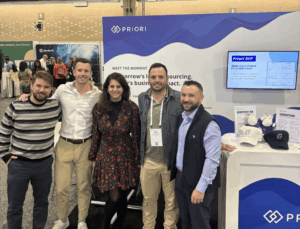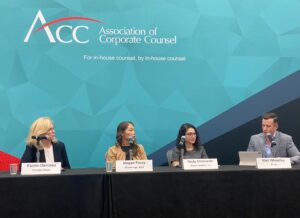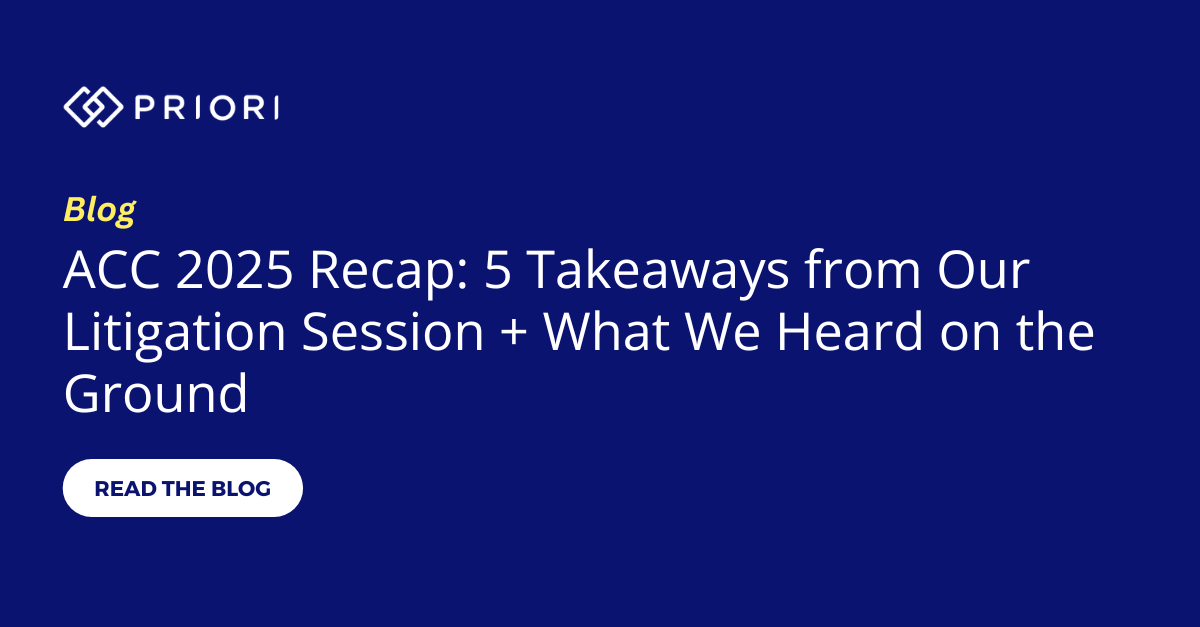The Priori team had a dynamic few days in Philadelphia at the 2025 ACC Annual Meeting and we’re grateful to everyone who stopped by our booth to connect with us.
For our CEO and Co-Founder Basha Rubin, ACC 2025 marked her first time attending. “My first ACC in the books … with a fantastic Priori team, many great client conversations, and of course, 🦄 swag,” she shared on LinkedIn.
Our Chief Commercial Officer Matt Wheatley shared some great reflections on LinkedIn, including a reminder that most business leaders can’t evaluate your legal work directly, so how you show value really matters.
The energy throughout the week reflected the broader mood in legal departments: a focus on doing more with less, without sacrificing quality, and a growing appetite for partners who can help them meet that moment.

Litigation RFPs, Debunked and Demystified
One of the highlights of the week was our panel session: The Litigation RFP Playbook: Case Studies & Resources for Achieving Better Litigation Outcomes, led by Priori Chief Commercial Officer Matt Wheatley. The session featured a thoughtful discussion with:
- Megan Fouty, GC & CHRO at Glowforge
- Karine Garceau, Commercial Manager at Google Cloud
- Neda Ghomeshi, Assistant GC at Ryder Systems
Together, they explored how legal teams are evolving their approaches to outside counsel selection, whether through formal RFPs, structured scorecards, or clear pricing frameworks.

5 Key Takeaways from the Conversation
1. RFPs don’t damage relationships—they clarify expectations.
When structured thoughtfully, RFPs strengthen firm partnerships by improving alignment and transparency. In fact, some in-house teams are using RFPs specifically to deepen those relationships, not replace them.
2. It’s not about lowest cost—it’s about best fit.
While cost containment is a factor, most teams prioritize strategy, experience, and value. In Priori’s platform, the lowest-cost firm wins less than half the time.
3. Creative pricing is becoming the norm.
Legal departments are exploring fixed fees by phase, flat-fee portfolios, and hybrid models to align incentives and increase predictability, especially in high-stakes litigation.
4. Scope clarity drives better outcomes.
The more precise the RFP, the more actionable the responses. Teams that take time to define scope, clarify assumptions, and ask focused questions get higher-quality proposals and stronger results.
5. Feedback matters.
The most successful teams close the loop. Whether it’s debriefing with firms or updating templates based on lessons learned, they treat each RFP as an opportunity to improve.
What’s Next?
Throughout the event, we heard from legal leaders looking to modernize how they select, evaluate, and manage outside counsel. Whether you’re building out your first RFP process or optimizing a mature program, Priori’s legal operations platform is designed to support you at every stage.
Want a closer look? Request a demo to see how we help legal departments streamline sourcing, gain real-time spend visibility, and strengthen law firm relationships through smarter processes.
